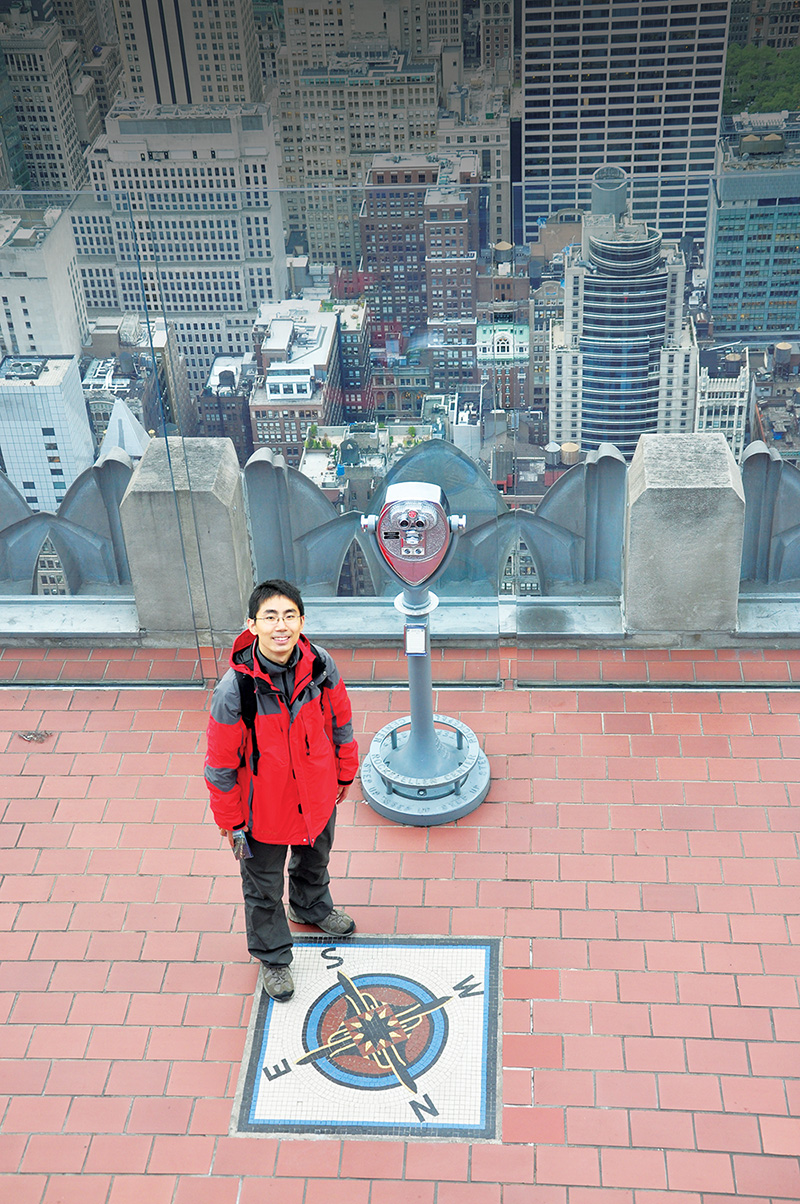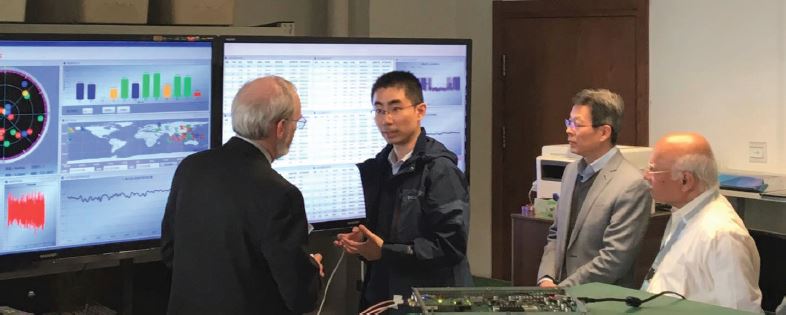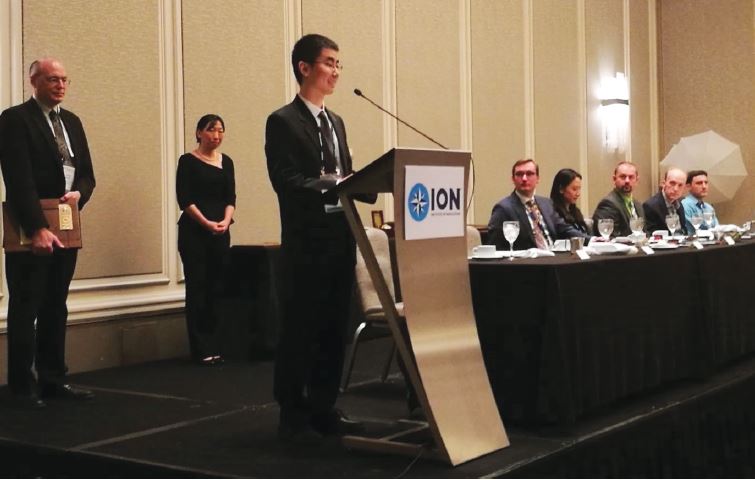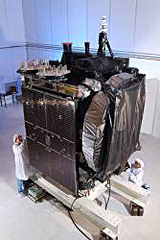Zheng Yao was born in Beijing and grew up in a house full of books. His parents provided the foundation but didn’t push him in a particular direction. When he was a teenager, a video game changed his course forever. Zheng found his own way in life, ultimately distinguishing himself as an academician, a top-flight GNSS engineer, and as a son, husband and father.
“Beijing has developed rapidly in the past 30 years and is now an international metropolis,” Zheng Yao told Inside GNSS, “but when I was young, the city was much smaller and the pace of life much slower. Those were the good old days.”
Before he started school and when his parents were at work, Zheng was looked after by his grandmother. She had previously been a primary school teacher and she taught Zheng a lot about language, math and the arts.
“There were books on various subjects everywhere in my home,” Zheng recalled. “The themes were all-encompassing, including philosophy, history, literature, mathematics, physics, and so on.”
That, he said, was his father’s doing. “My father is a bibliophile. He worked in government and he liked to buy books when I was a child. My family’s economic conditions were a little limited, but that didn’t stop him. He wouldn’t hesitate to spend months’ of salary on encyclopedias or classic books.”
Zheng himself has enjoyed reading since he was a child. “That was mostly what I did in my free time,” he said, “I read books. My parents tell me I could read from a very early age.
“The answer to almost any question I was ever curious about could be found in the books we had at home, and there were always more books than I could ever get through. I think all that reading helped to cultivate my critical thinking.”
Clear, If Not Deliberate
Zheng said he doesn’t believe his parents were deliberately trying to influence him, but their hobbies and habits did have a great impact on his life.
“My father is really good at thinking, but, compared to my mother, he’s not so enthusiastic about action. By training, my mother was an electrician. She once worked in a heating plant and was responsible for overhauling the entire electrical circuit. My mother could repair anything and everything, and she liked to make things, especially out of scrap items. She even taught me some practical electrical engineering skills, starting when I was in elementary school.
“So, from my mother’s side, the experience of repairing things and hand crafting cultivated my practical spirit. Ever since then, no matter what I do, I tend not only to explore inherent principles, but I also try to realize concepts in a tangible way. This then is how the influences of my two very different parents came together.”
At the same time that all this influencing was going on, Zheng said, his mother and father did not exactly try to micromanage his upbringing. “My parents almost never directed my school experience. From elementary school to middle school and high school, my father didn’t even know where my school was or who my teacher was.”
How He Caught the Navigation Bug
When he was in junior high, Zheng said, a video game, of all things, played a key role in setting the course of his life. “For a while I was obsessed with a PC game called ‘Uncharted Waters’,” he said, “which is set against the backdrop of the ‘age of sail’. In order to play the game, players must consider not only the problems of navigation, geography, trade and fleet management, but also the impact of wind and currents on ships.”
Perhaps not surprisingly, Zheng’s new interest drove him to read more books. “One in particular had a big impact on me,” he said, “It was called Longitude, written by Dava Sobel. It’s about the race to discover how to determine longitude, a competition that lasted more than 200 years. I was and still am deeply attracted by this book and by this ancient discipline of navigation.”
While he never got to try sailing himself, Zheng did learn a lot about cartography and how navigation instruments work, including the theodolite, sextant, and chronometer.
“At the time, my feeling was that navigation was not so much a science as it was an art form,” he said, “something you achieved using mechanical clocks and astronomical observations. I never could have predicted that years later I would be doing research into the most modern kind of navigation technology.”
Major Decision
When it came time for him to move onwards and upwards, Zheng’s parents, true to form, expressed no strong opinions about what university he should attend or his choice of major.
Certainly there were no reasons to object when, in 2001, he enrolled as an electronic engineering student at Tsinghua University in Beijing. For Zheng it was the beginning of a long and fruitful association with the university, an association that has lasted to this day, to the greater benefit of both parties and, for that matter, everyone in the GNSS community.
“It was in my third year as an undergraduate student, that I first came into contact with GNSS,” Zheng said, “when I joined the Satellite Navigation Laboratory in our Department of Electronic Engineering.”
The lab’s leader was Professor Zhenming Feng and, as it happened, the development of China’s satellite navigation system, BeiDou II, was just beginning. There were many tasks to be accomplished, both in terms of academic research and in the engineering of the BeiDou receiver.
“The first project I worked on was the BeiDou II B1I signal-acquisition algorithm,” Zheng said, “a key part of the BeiDou II receiver development. As an undergraduate student, I had almost no applied engineering experience at that time, and the overlap between GNSS and what I had learned in class was very small. I could only rely on my own independent study to accomplish the algorithm research. Starting from scratch was very challenging.”
Zheng worked with passion and interest, completing the research and then applying what he’d learned towards a much more in-depth undergraduate thesis, for which he obtained Tsinghua’s “Excellent Undergraduate Thesis” award. Obtaining his B.S. in 2005, Zheng continued at Tsinghua as a doctoral student.

“Come, let us embrace at last”
“I gradually fell in love with GNSS as I deepened my understanding of satellite navigation,” Zheng said. “A key event in my career, I think, was when I submitted my first academic article to ION GNSS 2008, as a second-year PhD student, and unexpectedly won the ‘Student Paper’ award. The award included my fully funded attendance at the ION conference in Savannah, Georgia.
“That was my first international conference, and the experience greatly broadened my horizons and allowed me to see the important revolution that was taking place in my area of research. I had the opportunity to meet many GNSS experts and received much positive feedback that motivated me to carry out subsequent research with greater enthusiasm.”
Zheng’s doctoral project concerned the acquisition and tracking of the new-generation GNSS signals. GPS was being modernized and the Europeans were building Galileo, and the processing of new GNSS signals whose structure was different from traditional GPS signals had attracted widespread attention in both academia and industry.
Among the new innovations that had appeared were the use of binary offset carrier (BOC) modulation and the availability of a data-less, or pilot, channel along with the usual data channel. For his doctoral project, Zheng conducted research into these two aspects. He eventually proposed a side-peaks cancellation analytic design framework for unambiguous processing of the BOC signals. “I applied this analytical model to specific algorithm designs that resulted in a General Removing Ambiguity via Side-peak Suppression (GRASS) algorithm for unambiguous acquisition, and a Pseudo correlation function based Unambiguous DLL (PUDLL) for unambiguous tracking, respectively.
“I worked very hard on this research and the result was that I obtained my PhD degree one year ahead of the nominal time,” Zheng said. “I received the honor of ‘Outstanding Doctoral Graduate’ of Tsinghua University and I was awarded the university’s ‘Excellent Doctoral Dissertation’ award.”
A Lengthening String of Accomplishments
In 2010, Zheng became an assistant professor in Tsinghua’s Department of Electronic Engineering. In that same year, signal design for the BeiDou-III satellite began. With his detailed understanding of the new navigation signals, Zheng was invited to join the BeiDou Navigation Satellite System Signal Task Force. “My research and engineering experience had laid a solid foundation for my signal design research for BeiDou III, with its particularly stringent requirements,” he said.
Zheng attacked the problem with his characteristic zeal. He proposed the Asymmetric Constant Envelope BOC (ACE-BOC) technique that multiplexes multiple signals with arbitrary power sharing onto two sidebands of a constant envelope spectrum-split integrated signal. Such highly flexible techniques have greatly broadened the scope of dual-frequency multiplexing, enabling the configuration diversity of the BDS B2 (B2a+B2b) signal for MEO/GEO/IGSO satellites under the same payload implementation structure and supporting in-orbit reconfiguration.
Subsequently, Zheng proposed several low-complexity variants of the ACE-BOC technique, significantly lowering the payload complexity barrier for BDS satellites. He also proposed the Quadrature Multiplexed BOC (QMBOC) structure, which is the BDS implementation of the MBOC modulation.
In 2013, Zheng led a small team that developed the first software-defined full-GNSS-band real-time receiver capable of receiving and processing all of the open signals from all GNSS simultaneously. With the results of this work, he also achieved the first Galileo positioning fix in China.
“The main project I currently lead,” said Zheng, “is the development of a regional positioning system that can provide high-accuracy navigation and positioning services in a signal-starved environment. This work is not just about designing signal and receiving algorithms, but more about designing the architecture of the entire system.
“Recalling my research path since I entered the GNSS field, from designing signal processing algorithms to designing the signals themselves, and then to designing the entire system, the problems I face are becoming more and more open, and the space for me to work is also growing. Although the challenge is ever greater, I am excited to meet these challenges.”

The More Things Change…
Throughout his career at Tsinghua University, Zheng has maintained close ties to his family. “Like the majority of my contemporaries in China, I have no brothers or sisters,” he said, “because of the country’s family-planning policy. However, both my parents are still alive, both of them are retired.
“My father is still surrounded by books, he still likes to read, especially Chinese classical literature and history. And he has a good memory. To this day, my father can quote from the classics, which he does with pleasure, even in the most mundane of conversations.
“My mother still has strong creative and practical abilities. She has continued to learn new skills, even after retirement. For instance, all by herself, she has learned DV shooting, video editing and clipping, the results of which are rather professional-looking.”
And, along the way, Zheng also started his own family, marrying his childhood sweetheart, Xiao, whose name means “smile”. The story of Zheng’s love would fill one of the thicker volumes on his father’s bookshelves. Here, a brief summary must suffice. Zheng met his wife for the first time when he was 12 years old. She was one of his classmates in school. “One cannot predict when his Ms. Right will appear,” Zheng quipped. “What one can do is grab her, though a bit early she may be.
“Xiao and I were married after 15 years of acquaintance. By now, we have been in each other’s lives for twice as long as we were not in each other’s lives, if you follow my meaning. We have so many common experiences and memories, just thinking is full of tacit understanding; we often have the same idea and say the same sentence simultaneously.
“On the other hand, my wife knows little about science and engineering. She does financial work. But she gives me great support and understanding. The most precious thing to me is that she is willing to be a pair of listening ears, whenever and wherever.”
Completing the family portrait is Zheng’s four-and-a-half-year-old son.
“I must admit,” Zheng said, “that this is an impossible balance between parenthood and academia. The flexibility afforded by an academic life does not make up for the built-in pressures and workload of academia. Especially as a tenure-track faculty member, I work most of the time, even in the evenings and on weekends.
“We live in an apartment on the Tsinghua University campus. The atmosphere, sports facilities, museums, libraries, and other facilities at the university have been a good influence in my son’s life. We often swim, go to concerts and visit exhibitions together. But what I like to do most is just to answer all the strange sorts of questions he asks.”
For his own personal edification, Zheng enjoys painting, something he often did as a child. “I learned it from my grandmother,” he said. “I have always liked painting, especially line drawing and traditional Chinese painting.” In fact, for more than 14 years, from his elementary school years through university, Zheng was in charge of the hand-painted posters, i.e. blackboard newspapers and wall newspapers, in his classrooms.
“I have other creative hobbies,” Zheng said, “but, as I mentioned before, the main challenge at this stage is the balance between parenthood and my work. So, when I have free time, I stay with my family as much as possible.”
Bravo Zheng Yao, the better for you and for all of them.
Compass Points
Professional Path
Since leaving high school, Dr. Zheng Yao has spent his entire academic and professional careers at the same institution, Tsinghua University in Beijing. Since 2014, he has held the position of Associate Professor in the Department of Electronic Engineering.
Engineering Specialties
Zheng is specialized in navigation signal processing, GNSS signal design, real-time GNSS software-defined receiver design, regional location technologies, and personal and vehicular positioning in challenging environments.
Other Technologies
Zheng believes no navigation solution is a panacea. Thus, in addition to satellite-based navigation technologies, he has also worked with inertial technologies and pseudolites.
Engineering Mentor
Zheng said, “Already when I was a young child, my mother taught me a lot of electrical engineering skills, such as soldering components and circuit troubleshooting with an AVO meter. These experiences had a lot to do with my later work in engineering.
“In addition,” he said, “My doctoral supervisor, Professor Zhenming Feng, and the director of the laboratory, Professor Mingquan Lu, gave me great support in my early career. I have learned much from Mr. Tom Stansell and Dr. John Betz, and of course I have also learned an enormous amount from all of the people who have worked with me over the years.”
GNSS Event that Most Signified to You that GNSS had ‘Arrived’
Zheng knew that GNSS had become a reality when, in December 2012, the China Satellite Navigation Office (CSNO) formally declared that BeiDou II had begun to provide PNT services for China and most of the Asia-Pacific region.
What Popular Notions About GNSS Most Annoy You?
One of Zheng’s pet peeves, he said, is, “the way many people misunderstand the working principle of GNSS and think that the satellites detect and track individuals and then send the location information to them, so they think GNSS may violate their privacy. And then others think that all the information is provided by the map app in their smartphone.”
Favorite equation
Fourier Transform:
“The Fourier transform offers us two complementary insights to examine and understand the world:” said Zheng, “the time domain and the frequency domain. Both of these two domains are as necessary for signal processing as two eyes are for correct visual perception. Although we can see with either eye, for proper perspective, both eyes are essential.”






